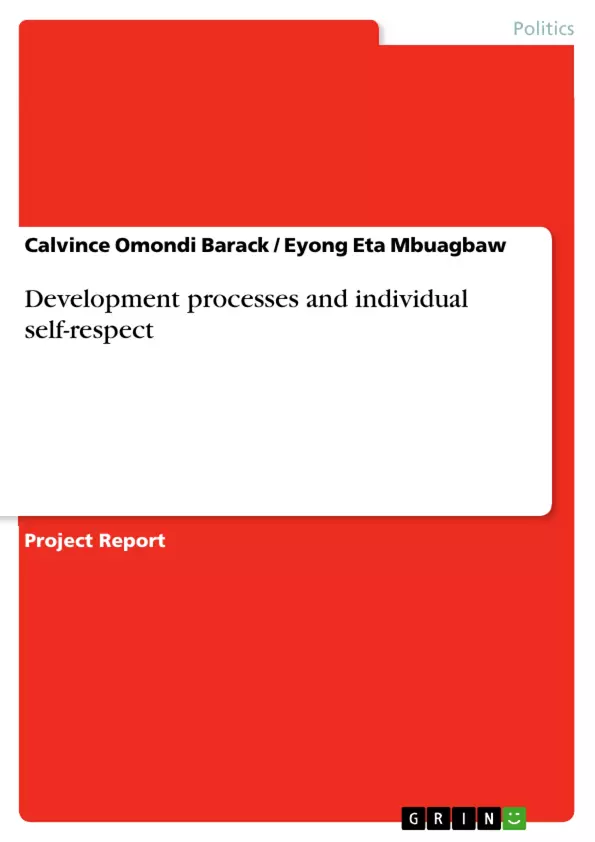This paper begins with an introduction on the importance of self-respect and its conception. It then, proceeds to the methodology section highlighting the research question, the method of inquiry, study limitations and literature review. It moves to look at the concept of Self-respect by John Rawls in his Theory of Justice where the two key components of self-respect is highlighted. It then continue to the discussion and Analysis section where the three aspects of self-respect in the category of individual values, free-will and capabilities are discussed in relation to development processes. Then, it takes a reflection on the specific development strategies of participatory development and women empowerment by highlighting the actual obstacles in guaranteeing self-respect in the processes of development. The paper then concludes that without some minimum guarantees on basic conditions of living, realization of self-respect in development processes will remain quite a challenge.
Inhaltsverzeichnis (Table of Contents)
- INTRODUCTION
- METHODOLOGY
- Research Question
- Methods
- Literature Review
- Study Limitations
- THEORY
- DISCUSSION AND ANALYSIS
- Individual values
- Free-Will
- Capabilities
- Reflection
- CONCLUSION
Zielsetzung und Themenschwerpunkte (Objectives and Key Themes)
This paper examines the role of self-respect in development processes, analyzing how these processes have upheld or failed to uphold the concept of individual dignity. It focuses on the theory of justice by John Rawls and his conception of self-respect, utilizing the key aspects of individual values, free-will, and capabilities to understand how development strategies incorporate or fail to incorporate self-respect. The paper draws upon various scholars who have contributed to development ethics, including Denis Goulet, Amartya Sen, and Martha Nussbaum.
- The importance of self-respect in development processes
- John Rawls' Theory of Justice and its application to development
- The three key aspects of self-respect: individual values, free-will, and capabilities
- The role of specific development strategies such as participatory development and women empowerment
- The challenges of guaranteeing self-respect in actual development implementation
Zusammenfassung der Kapitel (Chapter Summaries)
- Introduction: This chapter introduces the concept of self-respect in development, tracing its origins and significance. It explores the evolution of development themes and strategies, highlighting the importance of considering individual dignity in various cultural contexts.
- Methodology: This section outlines the research question that drives the paper, detailing the methods used in the study, including literature review and analysis. It also explains the specific principles and concepts employed in analyzing development processes.
- Theory: This chapter delves into John Rawls' Theory of Justice, specifically focusing on his conception of self-respect. It explores the essential components of self-respect as outlined by Rawls, laying the groundwork for the analysis of development strategies.
- Discussion and Analysis: This section examines the three key aspects of self-respect - individual values, free-will, and capabilities - in relation to development processes. It explores how various development strategies, including participatory development and women empowerment, have incorporated these aspects of self-respect.
Schlüsselwörter (Keywords)
Key terms and concepts explored in this paper include self-respect, development processes, individual values, free-will, capabilities, John Rawls' Theory of Justice, participatory development, women empowerment, development ethics, and the challenges of upholding self-respect in development implementation.
Frequently Asked Questions
How does John Rawls define self-respect?
In his Theory of Justice, Rawls highlights self-respect as a central concept involving individual values, free-will, and capabilities.
What are the three key aspects of self-respect analyzed?
The three aspects are individual values, free-will, and capabilities as they relate to development processes.
What is "participatory development"?
It is a development strategy that involves local people in the decision-making process, aimed at upholding their dignity and self-respect.
What are the obstacles to guaranteeing self-respect in development?
The paper notes that without minimum guarantees on basic conditions of living, realizing self-respect in development processes remains a significant challenge.
Which scholars are cited regarding development ethics?
The paper draws on the work of Denis Goulet, Amartya Sen, and Martha Nussbaum.
- Arbeit zitieren
- Calvince Omondi Barack (Autor:in), Eyong Eta Mbuagbaw (Autor:in), 2014, Development processes and individual self-respect, München, GRIN Verlag, https://www.grin.com/document/385793



